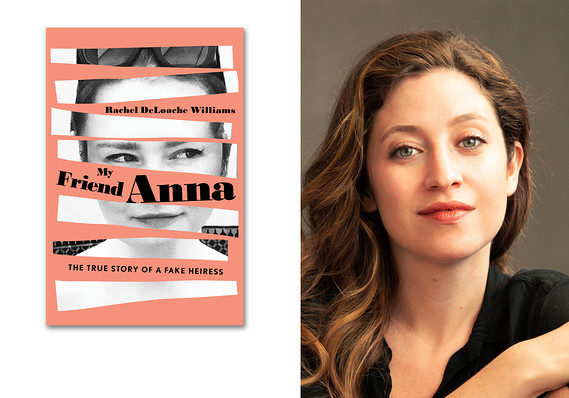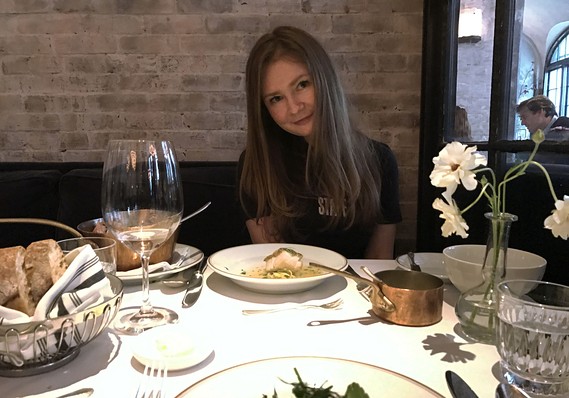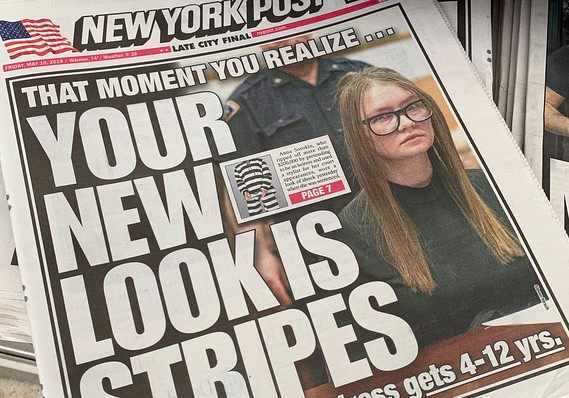How do you spot a fake heiress?
Rachel DeLoache Williams asks herself that question three years after meeting the woman who introduced herself as Anna Delvey — later revealed to be Anna Sorokin — at a nightclub in February 2016.
The club, located on Manhattan’s Lower East Side, was called Happy Ending. DeLoache Williams looks back at their first meeting and sees the bitter irony in the club’s name. Theirs was a fast friendship that burned bright in the nightclubs and cocktail bars of Manhattan, but pulled DeLoache Williams into one of the most infamous New York City society scandals in recent years. Her friend had conned celebrities into believing she was worth an estimated $67 million.
“She wasn’t extraordinary,” DeLoache Williams recalls. “Her voice was high-pitched and she was smiley. She was choosy about who she spoke to, but she was much like other people I had met in New York.”
Anna Delvey’s real name was Anna Sorokin. She was not a German heiress, but a Russian con artist and grifter. Her favorite movie was ‘Mean Girls.’
Sorokin said she was a German heiress who wanted to start a foundation to help struggling artists and had interned at Purple Magazine. She was living in a hotel room at 11 Howard at the time, and had more than 20,000 followers on Instagram FB, +2.71% . DeLoache Williams, then a photo editor at Vanity Fair, wasn’t impressed by social-media clout — she was used to working with boldfaced names and celebrities. But there was a vulnerability and gentleness to Sorokin that drew her in.
She did notice weird things about Sorokin, too. “She was demanding and rude to waitstaff,” DeLoache Williams said. “She did not say ‘please’ and ‘thank you.’ When an elevator opened, she wouldn’t wait for other people to get off.”
 Simon & Schuster
Simon & Schuster
Don’t miss: My mother stole my identity and racked up $500,000 in debt
Despite her social-media following and ability to attract dinner-party guests like actor Macaulay Culkin, Anna was not what she seemed. Her real name was Anna Sorokin and she came from a working-class family in Domodedovo, a satellite town in the southeast of Moscow. Her father was a truck driver and her mother worked at a convenience store.
Sorokin was a con artist and grifter, DeLoache Williams would later discover when she opened the New York Post NWSA, +1.88% after their friendship ended — and after being scammed out of $62,000 for a vacation at a $7,000-a-night resort in Marrakesh and flights there and back. Sorokin’s favorite movie was “Mean Girls,” according to her childhood friend in Russia.
‘She was demanding and rude to wait staff. She did not say “please” and “thank you.” When an elevator opened, she wouldn’t wait for other people to get off.’
“Her behavior mirrored that cliquish, elitist culture and society,” DeLoache Williams said. While Sorokin’s behavior was sometimes odd, she never suspected that her friend was an impostor: “I rationalized a lot of her behavior and made up backstories when I didn’t have explanations.”
Sorokin, now 28, was arrested in October 2017 and sentenced in May to four to 12 years in prison. Judge Diane Kiesel said Sorokin had been “blinded by the glitter and glamour of New York City.” “I am stunned by the depth of the defendant’s deception,” the judge added.
Sorokin was convicted of multiple counts of larceny and theft. She had falsified bank records and applied for a $22 million loan to fund a private arts club. She was turned down, but did receive a $100,000 loan from one bank. Kiesel ordered Sorokin to pay nearly $200,000 in restitution and a $24,000 fine.
 Rachel DeLoache Williams
Rachel DeLoache Williams
MarketWatch spoke to DeLoache Williams, the author of “My Friend Anna: The True Story of a Fake Heiress,” about how her former friend scammed her out of tens of thousands of dollars:
MarketWatch: What attracted her to you as a friend?
DeLoache Williams: She was fun, spontaneous. I thought she was smart. Her foundation was fun to talk about. It was going to have multi-disciplinary pop-up events. She was not smart or organized in relation to that. She knew what artists were doing where and when. She clearly fooled enough banks and hedge funds that I believed her with her foundation plans.
MarketWatch: Looking back, did you ignore any red flags?
DeLoache Williams: I never saw telltale signs to tell me this person was an impostor, or living a lie. Mostly, I noticed things like entitlement and rudeness. Anna did say things like, “It’s all going to work out for me or all go terribly wrong.” I took that to mean she was referring to her art-foundation project. The time we spent together was a little over two months. I spent two years following that little blip in my life, trying to reckon with it.
‘Both of my parents are clinical psychologists and I was aware that she was troubled, but I wanted to be aware to be a good friend to her.’
She had had a falling out with a girl when I met her. It had to do with her insensitivity. Not money. She delivered some bad news to that friend, a really hurtful piece of information. It has to do with a relationship. I believe it was related to her sociopathy. She didn’t have empathy for that person and she wasn’t able to empathize.
Both of my parents are clinical psychologists and I was aware that she was troubled, but I wanted to be aware to be a good friend to her.
MarketWatch: This friendship has some important lessons, particularly for romantic relationships.
DeLoache Williams: I do think some of these lessons translate into romantic relationships, especially if you are projecting onto somebody who you want them to be. People show you who they are through their actions.
MarketWatch: How did you rationalize her behavior?
DeLoache Williams: When Anna was rude to a waiter, I thought that maybe she didn’t have parents to teach her manners. I tried to help her, like a little sister. She was weirdly socially inept, but also very charismatic.
‘I thought that maybe she didn’t have parents to teach her manners. I tried to help her like a little sister. She was weirdly socially inept, but also very charismatic.’
MarketWatch: You took a trip to a luxury resort in Marrakesh. You ended up with $62,000 on your credit card. How did you get tricked into that?
DeLoache Williams: The trip was not presented as this “all-expenses-paid” vacation. It started with one little thing, and another thing on top of that. You miss the sleight of hand.
Anna said she was making a documentary about starting her art foundation and she said she wanted to feel like what it felt to have a camera around. She pitched it as a “I’m going to get this villa — who should we invite?” She put the cart before the horse, in that way.
I was already going to France on a work trip, so I packed this on the week before that. She invited a personal trainer and a photographer, and said she would pay for their travel and expenses, and then she added, “I’ll get yours too, of course.” I think she really enjoyed playing this character who was generous, but I now see it as part of the con.
 Rachel DeLoache Williams
Rachel DeLoache Williams
MarketWatch: It’s both amazing and crazy that she persuaded you to pay for the whole trip. It started with the plane tickets, right?
DeLoache Williams: It was one small act after another. She said she was stuck in meetings, allegedly, on the day we were supposed to leave. It didn’t strike me as alarming. I figured she didn’t know what time she was going to finish work. I was like an involuntary producer. She gave me a credit card to use and it was declined. She said she would wire me the money the following week. The flights cost around $4,000.
‘She picked out $1,300 worth of dresses. Her card didn’t go through. I thought she hadn’t told her bank that she was in Morocco.’
MarketWatch: And it got worse in Marrakesh.
DeLoache Williams: She picked out $1,300 worth of dresses. Her card didn’t go through. I thought she hadn’t told her bank that she was in Morocco. I didn’t know there was a problem with the hotel until midway through the trip. I saw Anna being pulled aside by two managers. They refused to leave without a functioning credit card. I had given them my card as a temporary hold. They put the bill on my card when I checked out.
The hotel cost around $52,000. Anna hired a private butler, tour guides, cars and tennis lessons every morning. She said, “I’ll wire you $70,000 to make sure it’s all covered.” I see this exorbitant sum on my credit card and I was grateful. I was shocked at the cost, so I was also terrified.
The most hellish part of the ordeal was the months following Marrakesh. Anna was emotionally and financially abusive. I changed the view of our friendship after Marrakesh. Also, we mostly just sat in the hotel. We could have done that in New York. I was a little frustrated but hyperaware that I was a guest. I was very deferential.
MarketWatch: How did you get the money back? I’m surprised you managed to do that.
DeLoache Williams: My corporate card was charged without my consent and American Express AXP, +1.42% protected from that after Anna’s arrest. The hotel managers effectively stood in the doorway to block my way. I was repeatedly told by the hotel managers that the credit-card charge was temporary. I was a young female in a foreign country and I was put under pressure.
‘I was repeatedly told by the hotel managers that the credit-card charge was temporary. I was a young female in a foreign country.’
I contested the charge a lot of times. The case was closed and I’d have to reopen it. Amex is wonderful. Some other credit-card company probably wouldn’t have allowed me to reopen the case so many times. (A spokeswoman for American Express said the company couldn’t comment on specific cases.)
MarketWatch: After you texted with Anna for months and she was arrested on Oct. 3, 2017, you reported her to the authorities.
DeLoache Williams: When Anna’s story broke in the New York Post, I emailed the district attorney’s office in New York and sent them a link to the article. I had tried going to lawyers, but if I had sent a demand letter she would have had 30 days to contest it and, if she left the country, I would have to go abroad to file suit. It didn’t seem like a viable option.
I had a binder of evidence, text messages, list of names and timelines, a printout of the credit-card statement, every piece of information. Trying to get the money back from her was so destabilizing. I couldn’t find an explanation for it. Gathering those documents was the only thing that made me feel productive.
I went to the police first. They weren’t very sympathetic. An officer said, “With your face, you could start a GoFundMe page to get your money back.”
 Rachel DeLoache Williams
Rachel DeLoache Williams
MarketWatch: When did you last see her?
DeLoache Williams: I saw her when I was testifying at her trial. I had to identify her as the defendant. She looked at me and smirked.
MarketWatch: How was testifying?
‘I went to the police. An officer said, ‘With your face, you could start a GoFundMe page to get your money back.’
DeLoache Williams: It was stressful for so many reasons. When I saw how juvenile and remorseless she was, I realized that she was the least of my worries. The lawyer was trying to assassinate my character. He brought up my book deal and movie options even though Anna and her lawyer were working with Netflix NFLX, +3.82% . (Netflix did not immediately return request for comment.)
I worked really hard to do something positive with this experience. If I were planning to write a book, I certainly wouldn’t have wanted to be tied to something like that. I have a bucket-list goal: “Do something great, so when people Google GOOG, +2.62% GOOGL, +2.58% me something else will come up.”
MarketWatch: Who would you like to play you in the movie?
DeLoache Williams: I don’t have opinions about that. I’d like Larry David to play me and Danny DeVito to play Anna.
MarketWatch: I bet you didn’t realize you’d get caught up in one of the most bizarre tabloid stories in recent years when you left Knoxville, Tenn.
DeLoache Williams: It’s weird that the story has such legs. It’s like “Gossip Girl” with a better plot.
(This interview has been edited for style and space.)











